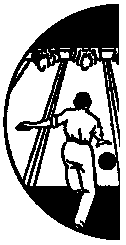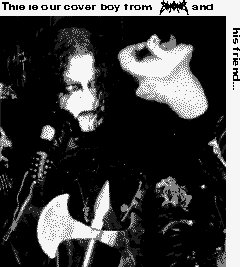 .
.
by Clay
Clarinetist/saxophonist Michael Moore has recorded with some of Europe's leading jazz musicians and with Han Bennink and Ernst Reijseger he is part of the Clusone 3. A few years ago he founded the Ramboy label and it was just following the release of that label's sixth and seventh albums that Clay Glad lured Moore into the KZSU studios for a very impromptu interview. This interview was conducted on the Hammer, Anvil and Stirrup program of February 3rd, 1995.
CG How did the Clusone 3 collaboration come about?
MM Well, we'd been playing together since 1982, or something with the ICP, Misha Mengelberg's octet. And a long time ago we had done some concerts as a trio. It didn't really work out.
CG Musically?
MM Yeah, it didn't really work out musically, I don't think. We just weren't comfortable. And then maybe about 5 years ago Ernst [Reijseger, Clusone 3 cellist] was asked to make a group for this nice, intimate jazz festival in the mountains of Italy, in a place called Clusone. He invited the two of us and also Guus Jansen to play piano, but at a certain point Guus decided he didn't want to do it anymore. We decided that rather than replace him we'd just keep going as a chord-less-guy trio.
The first CD [Bennink/Moore/Reijseger: "Clusone 3" Ramboy #01] was from a radio concert in Geneva. And the 2nd CD [Clusone 3: "I Am an Indian, Too" Ramboy #05] was taken from performances in Europe and in Canada in `91, I think, or `92. And then the third CD [Clusone 3: "Soft Lights and Sweet Music" HatArt 6153] is ...
CG ... the "concept album" ...
MM ... the "concept album". Thank you very much, Werner Uehlinger! [Uehlinger runs the Swiss label Hat Hut.] He wanted to record us, but we had to have a "concept."
CG Was it Uehlinger who came up with the concept [an album of Irving Berlin compositions] ?
MM No, it was actually me. We had been playing some Irving Berlin before that. Some of these Han had been playing for years. He knew the stuff because he used to play those dumb jobs at air force bases when he was 17 years old. So he's very happy when I suggest a tune like "There's No Business Like Show Business". And I thought it was a concept that we could find a lot of space in. For me the tunes are really simple and really strong, so ...
It's not the kind of group that lends itself to sensitive harmonic interplay, or ... harmonically complicated music. We can play that, but that's not really our forefront. We can find other ways to mess with material, I think.
CG You have a number of other projects going on. Is the ICP orchestra still in existence?
MM Yeah, I leave tomorrow to go back (to Amsterdam) and most of February is ICP gigs and Clusone 3 gigs for me. When I left there was a big fight between Han and Misha over something ... So when I left Han was telling Misha that he should find another drummer for ICP, so ... Well, they're kind of like an old married couple sometimes.
CG Now tell me about your octet, which I heard for the very first time today - Available Jelly ["Monuments" Ramboy #07].
MM Well this originated as a musical accompaniment to the Salt Lake City mime troupe, which was in existence for a few years in the late seventies. Very talented mimes and dancers who decided to go their own separate ways, but before they did they did a few tours of Europe, and I originally went to Europe to join them for the summer. If you play for theater then you end up playing some circus kind of music. It was always a brass band with drums--this kind of thing--there was no "chord guy", again. So we relied on counterpoint a lot--trying to identify the chords in our own skeletal way. Since then it's become more of a jazz/improvising band and since this CD it's really started flying, I think. Wolter Wierbos has joined us, a couple of people have left ... We should actually do another CD real quick, I think. It's a really nice group right now.
CG On your new album as a leader ["Chicoutimi" Ramboy #06] you do have a "chord guy" [pianist Fred Hersch] ...
MM Yeah!
 .
.
CG "Chicoutimi" has a very different sound than the last couple of albums under your name, and you say in the liner notes that some of it was inspired by the Jimmy Giuffre Trio (with Paul Bley and Steve Swallow) and also by some Lee Konitz/Gil Evans duets, which I'm not familiar with ...
MM You don't know those? Oh, those are great! It's two CDs and they're recorded in a Greene Street club in New York in 1980 or '81. Just in front of people ... eating, or something. But they're beautiful and Gil Evans plays so well. He never wanted them released, because he was embarrassed about his piano playing, but it's fantastic, very orchestral-sounding, and he leaves a lot to the imagination.
So, that was a point of departure. This is also, for me, a reaction to playing with the Clusone 3 and that sort of, uh, outlandish expressionism all the time. This is much more contained. I suppose you could say it's romantic, or something.
CG I want to ask you about your move to Amsterdam and what it's like to live and work there. How long have you been living there now?
MM Well, the first time I came was in 1978. I went back and forth between there and New York for quite a few years. All the time spending more time in Amsterdam because I had more work there... or more interesting work. It was never my intention to say, "I'm tired of this, I'm moving to Europe!" or something like that.
I was never really comfortable in New York, anyway. I'm not that aggressive. I sort of wonder what I would be doing if I had stayed there, but I can imagine it might be something like along the lines of what Marty Ehrlich is doing, <laughs> because he was a guy I went to school with.
CG How many venues could one expect to hear this kind of jazz in Amsterdam? There are some famous ones, of course. The Bimhuis ...
MM Surprisingly few in Amsterdam. So, most of the work isn't there. We'll play at the Bimhuis and then once in a while we'll play at a place called the Icebreaker ... or the Paradiso, or the Felix Meritus, which used to be the old concert hall before they built the Concertgebouw. But there's really very little going on except the Bimhuis. That's the only place that really has regular programming for this kind of music. And that's a place where you really have to book four or five months in advance, so there's no place to go if you have an idea you want to present quickly, which is kind of sad. But there are a lot of other places in Holland where you can go play.
 .
.
MM I would say so. Amsterdam audiences are pretty blasé at this point. If you wait long enough you can hear everything: all the African musicians who come and play in Europe and all the Americans, a whole lot of Asian music. So, in that respect it's a good place to live, but then it's nice to go other places to play where you feel like people appreciate the fact that you've actually come here to play.
CG So, like everywhere else there really isn't as much appreciation for local musicians, I suppose.
MM Yeah. There is in Amsterdam definitely a "fan club," like here. You have a little circle of friends who are interested in supporting these fantasies we have ... which is really important!
CG Do you find much work in European cities outside of Holland?
MM We play a lot in Germany, Austria and Switzerland and in Italy in the last few years. Not so much in France. They have their own heroes, I guess. The French are a bit more protective, perhaps like the United States in that respect. And in the last few years we've been going to Canada.
CG But not the United States because ... well, that's a complicated matter, I guess ...
MM I don't know, there's not enough interest, or something! We were once invited to come to play at the Knitting Factory, but then we found out it was a festival and we'd be splitting the door money with four other groups and we'd have to be finding our own hotels and stuff, so it would have cost us a whole lot of money.
CG Are the Dutch musicians pretty open to playing with anyone who comes to town?
MM Much more so than in other countries, I would say, especially if you compare it to France, for instance. When I went there the Dutch musicians were curious about how I could play. They weren't afraid that I was going to steal their work, or something like that. So that was really refreshing. And now there's a lot of Russians coming. There are also people from ex-colonies of Holland, from Curacao and Surinam.
CG Not too long ago we had Glenn Spearman on KZSU for an interview and, like a lot of American jazz musicians at the time, he found himself going to Europe to try to make a living, but he said that in the end he had to come back to the U.S. to get back to "the source," and made that sound as if there was something missing musically or spiritually for him in Europe. I wonder what your response is to that.
MM No, I don't think there's anything inherent in the land of the United States itself ...perhaps in the culture. I can understand wanting to come back to this culture, because, well, it's very known. And there's a lot of things you can do here on a grass-roots level to help the situation, which is pretty bad, I'd say. And .. yeah, to maintain your relationship to the struggle that's going on here I think would be pretty helpful. But in terms of actually hearing the musical information I think you can do that pretty much anywhere at this point if you have access to a halfway decent record store or radio station.
CG But I think that most people would say that Dutch jazz has a very particular character.
MM Oh, yeah. There's all kinds of nationalistic tendencies over there, whether they like it or not. Especially if you go into the realm of really free improvisation. The Dutch have a tendency to be to play these very short things and juxtapose various idioms with each other. Lots of games. Very playful.
There are a couple of people who make wonderful games for improvisers. Misha is one and Guus Jansen is another. Just fantastic sets of cues and responses, and these kinds of things that really make what otherwise would be probably pretty mediocre improvisations sort of come alive.
CG How do they compare with something like Zorn's Cobra, to name something well-known over here?
MM Well, with his pieces he has one "conductor" who receives information from all the players and he's rather passive. What happens in Cobra, for instance, is that there's no preconceived musical structure. I don' t think anyone in Holland had gone to that extreme. They're more interested in making pieces that sound a certain way but that have a lot of freedom in them. I think that would be the main difference.
CG Tell us a little bit about your label and how that came to be. Just too much trouble dealing with the record business, I suppose.
MM That's right. I started about four years ago. I had these two recordings - the American quintet and the Clusone 3 - that I really wanted to put out and I just couldn't be bothered with trying to shop them around to the various labels that I felt that I had a chance with. I had a few bucks left over so I decided just to put them out myself. I kind of enjoy it because I have complete control over it. I know exactly where they're going. And nobody tells me that they can't use this, or ... I HAVE COMPLETE CONTROL!! <laughs> But it's just a way to get my music out.
Some other albums on which Michael Moore appears:
* ICP Orchestra: Bospaadje Konijnehol I [ICP 028]
* ICP Orchestra: Herbie Nichols/Thelonious Monk [BVHaast 026]
* Gerry Hemingway: Demon Chaser [hat Art 6137]
* Georg Gräwe: Chamber Works, `90-'92 [Random Acoustics 3]
* Maarten Altena: Quotl [hat Art 6029]

 .
.
 KZSU
KZSU
 Stanford.
Stanford.